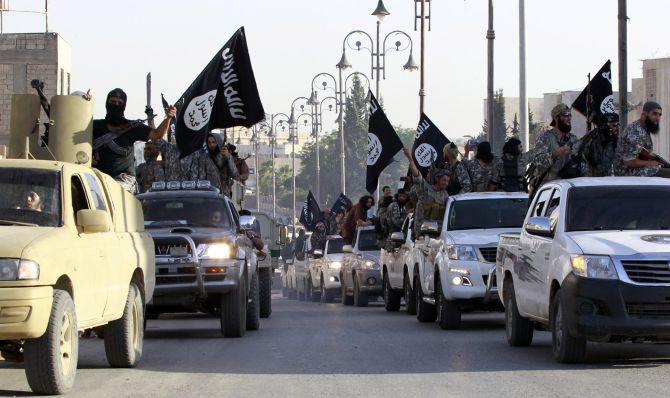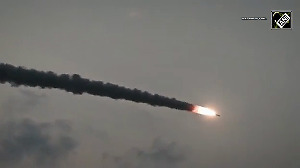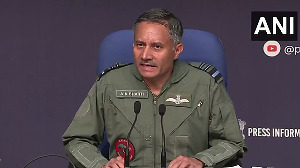
'What needs to be pursued as the operations progress is a degree of reconciliation amongst the other parties, less the more orthodox Al Qaeda affiliates,' says Brigadier S K Chatterji (retd).
Syrian President Basher Hafeez al-Assad has faced an omni-directional barrage since the Syrian crisis started. Is he today only a part of the Syrian problem or could he also be a part of the solution? Or is it both?
The disarray has clouded the global response to Islamic State. A few nations like Saudi Arabia that have funded the growth of IS at some stage will give him no quarter. Assad, in their opinion, will need to be eliminated from any possible power equation in Syria. However, the Americans have off late started to walk the path away from the Saudi Arabian pavilion to an apparently more open ended quest.
The West's dithering without a clear strategy made it easier for IS to gather momentum and devastate Syria, carve out a part of Iraq and fly its flags atop buildings in Kurdish towns. It has also led to a spurt in the morale of terrorist groups globally and radicalise a measurable segment of youth who were only peripherally so inclined till now.
IS's growth has strategically impacted the murky world of Islamist terror with Al Qaeda, occupying the highest pedestal within the terrorist clan so far, feeling threatened. The tangible evidence of Al Qaeda's unease was the launching of a branch for India, Myanmar and Bangladesh -- Qaedat al-Jihad.
The human tragedy in Syria has also continued, flowing beyond the Syrian landscape with millions of refugees now finding home in neighbouring countries. However, of late, a few statements by key players suggest a more realistic approach to Assad's status. He seems to have graduated from being entirely a part of the problem to being a part of the solution.
The United Nations envoy for Syria, Staffan de Mistura recently stated after meeting Assad that he needs to be a part of the solution. The statement drew a lot of flak from the Syrian opposition. The French foreign ministry also decried the approach. However, US Secretary of State John Kerry quite clearly accepted the necessity of negotiating with Assad for a final political settlement. American forces training Syrian groups have also started focusing on fighting IS rather than Assad's forces.
The Russians have been Assad's allies for long enough to consider him central to resolving the Syrian problem. Iranians, without whom a political solution at Damascus can hardly be lasting, continue to aid Assad. Of course, the Turkish president is definitely hostile to the regime in Baghdad. The Iraqis, facing the IS onslaught, are definitely not against Assad.
Assad's prime opponents are a few Gulf States who will never reconcile to the fact of a Shia-Alawite ruling a nation populated predominantly by Sunnis. Their opposition has nothing to do with democratic norms but is an offshoot of a purely sectarian agenda.
In their own countries, minorities live amidst tight controls and unequal opportunities. Even their Western educated ruling elites have either not imbued any liberal values or just understand that they will be able to remain rulers as long as sectarian divides, religious dictates continue to keep the population in fretters.
The adage -- nature abhors a vacuum -- is true in terms of political power in nation-States also. When the powers of the political establishments of States suffer degradation, fringe elements, partisan movements, radicals and anarchists start the race towards the capital while simultaneously weakening the State's institutions and establishments by coercion and violent means.
Syria faces a similar situation today and might have to contend with it even after IS is controlled. Should the Americans or other outside powers involved in the conflict foster the rise of a new power bloc in Syria to takeover Damascus post the elimination of Assad and containment of IS, there are chances of the instability continuing.
If Syria is to remain a nation-State, the central authority in Damascus will need deep roots in the Syrian populace, requisite military might and be inclined to practice inclusive governance.
The Free Syrian Army may find some patronage from the Western powers but there is little ideological congruence evident amongst its groups.
The fact that it is not easy to create a political establishment in a country that will have the will and the wherewithal to govern an inclusive State is pretty much borne out by the Iraqi and Afghan experience.
It would be prudent to recall the violence in Iraq after the Americans withdrew. Nouri-al-Maliki's government was not the best example of inclusive governance nor did he strengthen democratic institutions. His approach led to marginalising the Sunnis, spurring a rise in attacks by Sunni militias, a situation that still remains a challenge.
The apprehensions most parties have even today of Kabul's ability to keep Afghanistan stable after a decade of Hamid Karzai's regime is another pointer.
While a militarily weakened Assad is ready to negotiate today, the Western-backed Harakat al Hazam has decided to break up. It will not be wisdom per se to totally negate any role for Assad when the rebuild story starts its course.
Battling IS needs to remain the prime objective at this stage. What needs to be pursued as the operations progress is a degree of reconciliation amongst the other parties, less the more orthodox Al Qaeda affiliates.
Finally, once IS is dealt with, a better option would be to promote a national reconciliation government with all players ready to shun violence being a part of it.
Image: Islamic State fighters in Syria.






